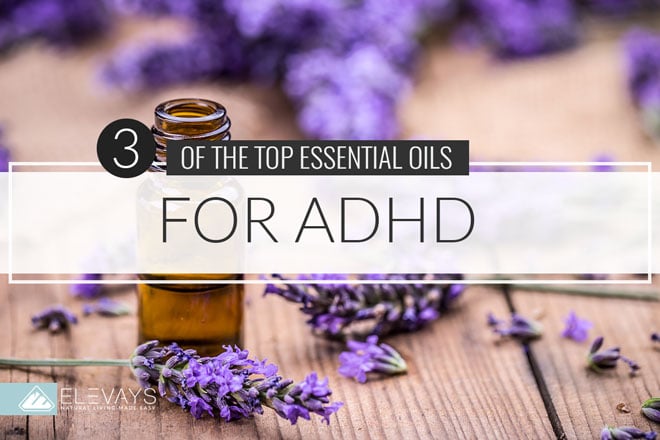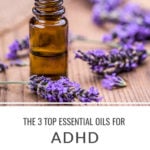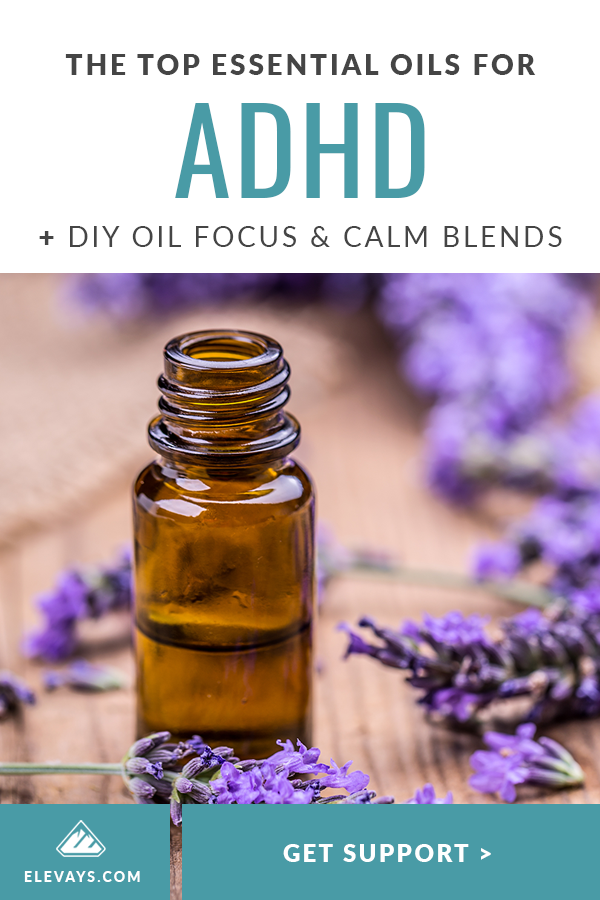Essential oils have many practical purposes for a wide range of ailments, including ADHD. You can use oils in a diffuser, apply them to your skin, or create a spray to relieve symptoms instantly.
Attention deficit hyperactive disorder (ADHD) affects 11% or 6.4 million American kids under the age of 17 and 4% of adults (1). It’s a familiar brain-based syndrome that makes everyday activities challenging. People with ADHD have trouble with concentration, controlling impulses, staying on track, reaching restful sleep, and hyperactivity.
With essential oils for ADHD, parents can help the entire family focus or rest without harmful prescription medication. Learn which oils relieve ADHD symptoms, what ages are safe to use oils, and the best way to use each.
TRUTH BOMB:
You’re
Already killing it!
If You Were More Consistent With Your Wellness Routine, You’d Be Unstoppable.
Why Use Essential Oils for ADHD and Focus Improvement?
Essential oils are popular natural treatments for many ailments. The scent offers aromatherapy benefits for anyone within reach. While most essential oils both boost focus and calm the body and mind, certain oils work better for ADHD.
You can use these oils alone when needed or pair them with other ADHD treatments, such as:
- Family training
- Behavioral management
Instead of medications, which come with harmful side effects, many people opt to use natural cures like essential oils for ADHD. Today, 6.1% of American kids take ADHD meds (1). But medications don’t always help fast enough- and sometimes they come with unwanted side effects. Many children on medication say they don’t feel like themselves while others’ natural personalities and uniqueness are lost.
Treatment is also expensive. Besides containing terrible toxins, ADHD medication costs around $14,576 each year (1). Over time, the money spent on meds can reach astounding numbers.
Do Essential Oils for ADHD Really Work?
The short answer is yes, and also-it depends. You should approach using essential oils for ADHD with caution. Limited research is out there on the effect of oils on ADHD. Check with your doctor before changing your treatment plan.
However, a case study by Dr. Terry S. Friedmann (2) shows certain essential oils make a noticeable impact on the symptoms of children with ADHD. In his research, the kids inhaled essential oils each time they started to feel scattered over a span of 30 days. The results show oils like vetiver, lavender, and cedarwood were the most successful for boosting performance.
Various studies also show promising effects. Lavender essential oil, for example, is proven to boost sleep quality in women after childbirth (3) and heart disease patients (4). Many essential oils other than lavender have also shown to improve sleep when inhaled (5).
The Top 3 Best Essential Oils for ADHD
These are the three best essential oils to aid ADHD symptoms, no matter what age.
Vetiver
Perhaps the best essential oil for ADHD, vetiver made the most notable difference in kids during Dr. Friedmann’s study (2). The oil contains plenty of relaxing benefits to calm chatter from the mind and promote restful sleep. It can help you concentrate or reach better quality sleep.
How to Use Vetiver Essential Oil for ADHD: Vetiver is also ideal because the scent lingers a long time, which is why it’s commonly used to make massage oils, perfumes, and foot rubs. You can ingest the oil internally as well, but an internal application method isn’t suggested for kids. Try adding 5-10 drops into bath water for relaxation, diffuse 3-5 drops, or add 1-2 drops with equal parts jojoba oil on each wrist.
The downside is that vetiver oil is sticky and can smell harsh to some. It comes with a high price tag as well- but well worth it if you’re looking for natural aid.
Lavender
Surprised? Lavender oil is highly versatile, mixes well with other essential oils, and works great for children.
Lavender is well-known for its calming abilities so it only makes sense that it works the same for racing minds. Lavender essential oil is also extremely versatile and comes with a wide range of benefits. The oil can help you relax after a stressful day, when you’re feeling nervous or anxious, or if you can’t calm racing thoughts. It’s a powerhouse of support for nearly any ailment, and lavender oil even aids peaceful sleep.
How to Use Lavender Essential Oil for ADHD: Use lavender oil as a spray for clothing or drop in a diffuser to make your home/office/classroom feel more calming.
Cedarwood
An excellent choice for a home, office, or classroom diffuser, cedarwood essential oil can help you create a positive environment. The rich, wood-like aroma helps balance emotions and calm racing and scattered minds. Dr. Friedmann named cedarwood the 2nd top essential oil of choice for treating kids with ADHD when vetiver isn’t available (2). It soothes the body and the mind, and the warm scent is relaxing. Cedarwood also smells much more appealing to most people than vetiver.
How to Use Cedarwood Essential Oil for ADHD: Add a few drops to a diffuser for the best results. The oil can also be used topically, and it works as a natural insect repellant when mixed into an unscented lotion.
8 Other Essential Oils for Focus and Concentration
If you’re wondering what other essential oils are good for concentration, the following list of oils offers focus-improving qualities. These are the oils to use when your goal is to focus and can also help with some symptoms of ADHD.
Other top essential oils that are commonly used for ADHD symptoms include:
- Frankincense – The soothing properties help calm overactive people, and the oil is an excellent way to support your immune system. Personally, I love to drop frankincense in my diffuser in the morning while I’m getting ready to get some work done at home.
- Bergamot – A natural stress reliever, Bergamot, is a popular choice to calm anxious feelings. When you are calm, you are more able to concentrate on the task at hand. This oil can also improve skin conditions such as eczema.
- Roman chamomile – Well-known for its calming effects, Roman chamomile soothes and comforts. If you’re trying to get to sleep fast and stay asleep, this is the oil for you. If you want to calm and comfort ADHD symptoms, this could also be a good option.
- Ylang-ylang – Calms and also treats ailments like headaches and nausea.
- Peppermint – Use peppermint oil to boost your focus and concentration in the middle of the day. It’s a perfect pick-me-up when you hit that afternoon slump, as the oil helps increase energy levels and alertness. Add a few drops to a diffuser during midday or rub a drop under your nose, on the back of your ears, and neck for added concentration.
- Orange – One study shows orange essential oil reduces anxiety and creates calm in a stressful environment (6). These benefits can transfer to aid ADHD symptoms. However, you shouldn’t spend time in the sun with citrus oil on your skin.
- Lemon – Citrus aromas are invigorating. They improve focus and concentration, and the oil can clean the air at the same time.
Many of these oils are also combined to tackle more than a single symptom. Roman chamomile and ylang-ylang, for example, mix well to create a blend with benefits for anxiety, stress, and depression. Each also offers calming properties perfect for ADHD.
What Essential Oils are Good for Calming Kids?
Children have developing bodies, so take extra care when using essential oils. Avoid peppermint, rosemary, eucalyptus, or any essential oil with an ingredient called 1,8-cineole in children under 10 years of age. It’s not likely but they may cause severe reactions.
Four different oils are safe and effective for calming kids over 5 years of age, such as:
- Lavender – The essential oil to try first, lavender is excellent for calming kids. Most children enjoy the aroma, and lavender oil can calm anxious and hyperactive kids alike.
- Vetiver – Known as the oil of tranquility, vetiver is perhaps the best essential oil for children with ADHD. It promotes overall emotional balance and relaxation.
- Cedarwood – Another top kid-friendly oil, cedarwood shows promising results in reducing anxiety and promoting calm in children.
- Orange – Orange essential oil offers a bright, refreshing scent that can boost focus. Don’t use this oil if your kids plan to play outside though.
How Do You Mix Essential Oils for ADHD?
Before you can use essential oils, you must mix them.
Topical Application
Essential oils must be diluted before you can place them directly on the skin. Otherwise, your skin may become irritated.
To mix essential oils for a topical aid, try adding them to a carrier oil such as fractionated coconut oil or jojoba oil. You can apply the mixture directly to your skin, but make sure to avoid your eyes, inner ears, and any open incisions or scrapes.
Pro Tip: Rub the oils directly into the skin to absorb it faster.
Aromatherapy
When you opt to breathe in oils rather than wear them, you can still alleviate symptoms. Inhaling essential oils allows the scent to travel into your lungs, brain, respiratory, and limbic system, which alters stress, heart rate, and blood pressure (7).
Diffuser
Although you can smell the oils directly from the bottle, using a diffuser or spray is more ideal for home, office, or classroom use. A diffuser dilutes the oil with water and evaporates both into the air, spreading the aroma throughout your environment. Add 5-8 drops into the water tank for the best results.
Pro Tip: When using a diffuser, make sure the model can work with essential oils. Some, such as hot steam models, are easily damaged. They may leak or suffer from other issues if you put anything other than water inside. Check the model before you buy to ensure it fits your needs. I love this diffuser for essential oil use.
Spray
Like a diffuser, making a spray involves mixing essential oils with water. Place between 5-8 drops of the oil you choose into an amber-colored bottle and shake thoroughly. Spray it around your home whenever you need a boost.
Pro Tip: Similarly, you can dilute the oils in a hot bath. The water mixes well, and the steam transports the vapors through the air.
How Do You Apply Essential Oils for ADHD?
There are two main ways to apply essential oils for ADHD: directly on the skin or in a diffuser. You could also create a spray to cover an entire room, and some oils are ingested for added benefits. However, where to put essential oils for ADHD may depend on what oil you use and your age.
Vetiver oil, for example, is better for creating a calm environment when you add 3-5 drops to a diffuser. You can also apply a drop or two of the essential oil to your wrists, neck, and chest to calm yourself, or make a massage oil by mixing 3-5 drops of vetiver oil with equal parts jojoba oil.
Invigorating smells to boost focus are better smelled in small amounts. Lavender oil, on the other hand, works wonderfully at the end of a stressful day. Rub the oil directly into the soles of your feet or add a few drops to a diffuser overnight to help you get some much needed zzz’s.
Kids typically prefer to wear or smell essential oils to gain their benefits. If you’re considering ingesting oils, talk to your physician first to rule out health complications.
How you use essential oils may also depend on personal preference. If you prefer to wear essential oils, dab a few drops on your inner wrist or essential oil diffuser bracelet and smell it throughout the day. Otherwise, a diffuser or spray works well.
Popular DIY Essential Oils for ADHD Recipes
Focus Blend
- 3 drops of Frankincense oil
- 2 drops of Lavender oil
- 2 drops of Lime or Mandarin oil
Mix the oils with equal parts unscented lotion and apply to your skin for lasting focus. You can also combine this blend in a diffuser.
DIY Calming Spray
- 5 drops of Lavender oil
- 5 drops of Vetiver oil
- 5 drops of Cedarwood oil
- Sweet Almond oil
Combine the essential oils in a 5-ml spray bottle and fill the bottle with a carrier oil. Screw on the cap, shake well, and spray the solution around your home.
Which essential oil for ADHD shows the most promising results in your kids? Share your experiences with us in the comments below.
Other ways to support better brain function and focus: supplements. Unfortunately, these days a lot of us aren’t getting enough essential vitamins and minerals through our diets. This has a lot to do with the depleted soil our food is grown in to the over-processed foods Big food markets to us. Supplementing with essential vitamins and minerals is well…essential…for optimal organ function. And this includes our brains! Our stomachs are consider our second brains, so what we eat directly impacts how we feel and function.
Life is busy these days, and we know how overwhelming (and messy) it can be to take 20 different supplements a day. That’s why we created a one-stop-shop line of supplements so that you can create space in your cabinets and be healthier! If you struggle with focus, our supplements will help! Our Beauty Collagen Complex is perfect for nourishing your second brain while our Organic Immunity Greens will stock you up on tons of supergreens and other foods for vitality. Lacking balanced energy? Our Hydration Superfood Energy is the perfect brain-powered boost and necessary hydration it needs to work optimally! Shop our delicious line of Superfood Supplements here.
Sources:
- The ADD Resource Center (2017). ADHD Numbers: Facts, Statistics, and You. Retrieved from: https://www.addrc.org/adhd-numbers-facts-statistics-and-you/
- Friedmann, T.S. (2001). Attention Deficit and Hyperactivity Disorder (ADHD). Retrieved from: https://files.meetup.com/1481956/ADHD%20Research%20by%20Dr.%20Terry%20Friedmann.pdf
- Keshavarz, Afshar, M. (2015). Lavender fragrance essential oil and the quality of sleep in postpartum women. Retrieved from: https://www.ncbi.nlm.nih.gov/pubmed/26023343
- Karadag, E. (2017). Effects of aromatherapy on sleep quality and anxiety of patients. Retrieved from: https://www.ncbi.nlm.nih.gov/pubmed/26211735
- Lillehei, A.S. (2014). A systematic review of the effect of inhaled essential oils on sleep. Retrieved from: https://www.ncbi.nlm.nih.gov/pubmed/24720812
- Lehrner, J. (2005). Ambient odors of orange and lavender reduce anxiety and improve mood in a dental office. Retrieved from: https://www.ncbi.nlm.nih.gov/pubmed/16095639
- European Society of Cardiology (2012). Short-term exposure to essential oils lowers blood pressure and heart rate. Retrieved from: https://www.sciencedaily.com/releases/2012/11/121129093419.htm







READ the Latest
Breakfast
Longevity
Health Habits
Health Habits